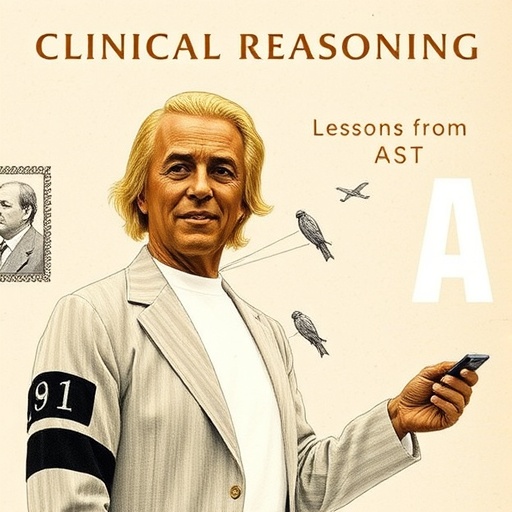In the realm of medical education, the integration of past experiences into a framework for clinical reasoning represents an emerging frontier. A recent investigation titled “What’s Past is Prologue: An Exercise in Clinical Reasoning” by McQuade, Leyens, and Simonson goes beyond traditional textbook methods to emphasize the importance of historical context in clinical practice. The authors argue that understanding the evolution of clinical reasoning is pivotal for new healthcare providers, as it shapes their decision-making processes.
At the core of clinical reasoning lies the ability to integrate a wide variety of knowledge—both contemporary and historical. This paper sheds light on how educational strategies that fuse past clinical cases with present-day practices can significantly enhance learning outcomes. The concept is straightforward: instead of only focusing on current medical literature and guidelines, incorporating diverse historical scenarios can provide a richer context. This shift has the potential to cultivate more nuanced and effective healthcare professionals.
The authors initiate their discourse by elaborating on the significance of clinical reasoning in medical education. They underscore that clinical reasoning is not merely a technical skill; it encompasses critical thinking, decision-making, and the ability to synthesize information from multiple sources. Research shows that experienced clinicians often draw on their past encounters to navigate complex patient scenarios effectively. Thus, understanding how past experiences shape present practices is essential for fostering future healthcare leaders.
Furthermore, McQuade et al. present an innovative educational model. This model encourages students to reflect on historical clinical cases, examining how healthcare paradigms have shifted over time. By bringing historical context into the educational framework, students can appreciate the evolution of medical knowledge and practices. This is particularly crucial in fields such as internal medicine, where the stakes can be exceptionally high, and the margin for error small.
In their examination, the authors highlight a wide range of historical cases that serve as educational touchstones. These cases provide context for understanding contemporary challenges in clinical reasoning. For instance, they discuss instances of diagnostic errors in the past and how those instances have prompted changes in educational curricula, encouraging a more reflective approach among students. This historical lens not only serves to inform future practitioners but also can lead to improvements in patient care.
The article further discusses the methodology behind their educational exercise. By integrating discussions of historical cases with modern clinical scenarios, educators can design curricula that reinforce the application of historical knowledge. The authors advocate for interactive learning experiences where students dissect and debate past cases, drawing parallels to current clinical challenges. This method fosters a deeper understanding and engagement with the material, making learning both dynamic and memorable.
An additional layer of complexity is added when considering how culture influences clinical reasoning. The authors point out that medical education is often influenced by cultural narratives—how certain historical cases are remembered and taught through generational lenses. By exploring diverse cultural perspectives on past medical cases, students can gain a more holistic understanding of clinical reasoning. The paper underscores the value of fostering an environment where varied narratives coexist, promoting inclusivity in healthcare education.
To validate their approach, McQuade et al. incorporated qualitative research into their study. Interviews with medical educators and students revealed that many felt a disconnect between historical clinical cases and contemporary practices. This disconnection, they argue, often leads to a lack of appreciation for the foundational aspects of clinical reasoning. By addressing these gaps through historical exercise, the authors anticipate a transformation in how students perceive their roles in clinical settings.
Moreover, the paper extensively reviews existing literature, linking robust educational theories to their practical application in medical teaching. They emphasize the importance of a multidisciplinary approach, arguing that input from various fields—including history, ethics, and sociology—can enrich medical curriculum design.
The transformative power of stories is another focal point in their work. Stories of past patients and their journeys through the healthcare system serve not only to educate but also to humanize the field of medicine. By acknowledging the emotional and ethical dimensions embedded in these narratives, students can develop greater empathy and awareness, key components of effective clinical practice.
In conclusion, “What’s Past is Prologue” is not just a paper; it’s a call to action for medical educators to rethink how history is integrated into clinical training. By acknowledging the rich tapestry of past experiences and their implications for present and future healthcare, we can help cultivate a new generation of healthcare professionals who are not only skilled but also deeply informed and empathetic.
As healthcare continues to evolve, understanding the lessons from historical practices will be critical. The integration of past medical cases into educational frameworks can serve as a powerful tool for enhancing clinical reasoning skills. This paper thus represents a timely and essential contribution to the ongoing dialogue surrounding medical education. It challenges educators to reconsider how they prepare future clinicians, promoting a more reflective and enriched approach to learning and practicing medicine.
By emphasizing the significance of historical context in clinical reasoning, McQuade, Leyens, and Simonson have opened the door to future inquiries in medical education. Their work serves as a foundation for subsequent studies that may explore the intersection of history and clinical practice even further. As we look ahead, the medical community is encouraged to embrace this holistic approach: recognizing that what has come before can indeed inform what lies ahead in the realm of healthcare.
Subject of Research: Integration of historical context in medical education and clinical reasoning.
Article Title: What’s Past is Prologue: An Exercise in Clinical Reasoning
Article References:
McQuade, C.N., Leyens, K. & Simonson, M.G. What’s Past is Prologue: An Exercise in Clinical Reasoning. J GEN INTERN MED (2025). https://doi.org/10.1007/s11606-025-09998-2
Image Credits: AI Generated
DOI: https://doi.org/10.1007/s11606-025-09998-2
Keywords: clinical reasoning, medical education, historical context, healthcare, curriculum development.




